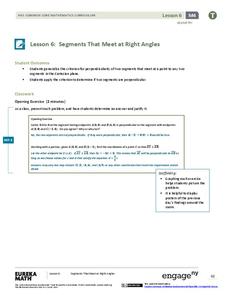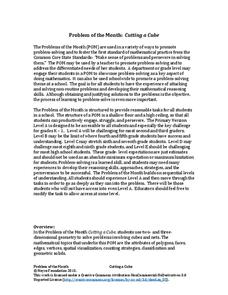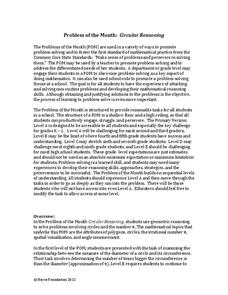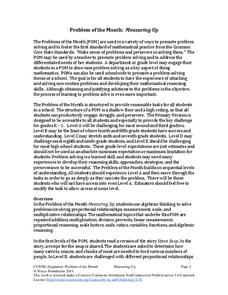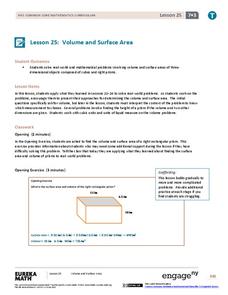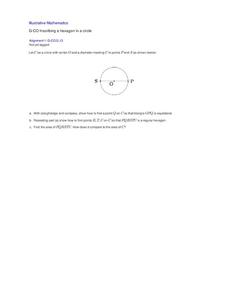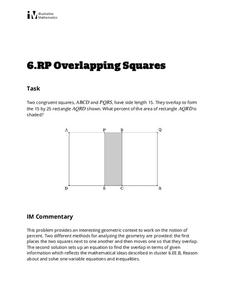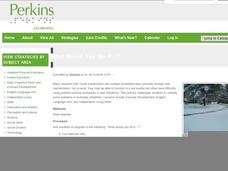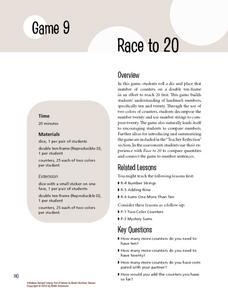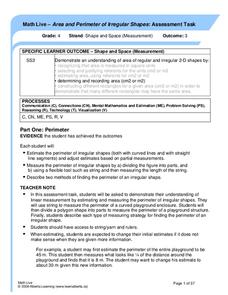American Chemical Society
Air, It's Really There
Love is in the air? Wrong — nitrogen, oxygen, and carbon dioxide are in the air. The final lesson in the series of five covers the impact of temperature on gases. Scholars view a demonstration of gas as a type of matter before performing...
EngageNY
Segments That Meet at Right Angles
Can segments be considered perpendicular if they don't intersect? Learners look at nonintersecting segments on the coordinate plane and make conclusions about the lines that contain those segments. They determine if they are...
Flipping Physics
AP Physics 1: Equations to Memorize
Saving the best for last, the final video in the series of 12 covers all of the equations young physicists should memorize because they are not on the equation sheet provided at the time of AP Physics 1 exam. This fast-paced video even...
Science Geek
Electrochemistry
Introduce redox reactions including how to identify and solve them. After reviewing the rules for assigning oxidation numbers, a presentation presents trends and vocabulary. Finally, it explains voltaic cells, electrolytic cells,...
EngageNY
Ratios of Fractions and Their Unit Rates 2
Remodeling projects require more than just a good design — they involve complex fractions, too. To determine whether a tiling project will fit within a given budget pupils calculate the square footage to determine the number of...
Noyce Foundation
Cutting a Cube
Teach the ins and outs of the cube! A series of five K–12 level activities explore the make-up of the cube. The beginning lessons focus on the vocabulary related to the cube. Later lessons explore the possible nets that describe a cube....
EngageNY
Chance Experiments with Outcomes That Are Not Equally Likely
The fifth portion of the 25-part series introduces probabilities calculated from outcomes that are not equally likely. Class members use tables to calculate probabilities of events, add outcome's probabilities, and find...
Noyce Foundation
Circular Reasoning
Examine the origin and application of pi in five different levels. The five lessons in the resource begin with an analysis of the relationship between the radius and circumference of a circle. The following lessons lead learners through...
Noyce Foundation
Measuring Up
Teach the basics of measurement and conversion with a five-lesson resource that builds an understanding of proportion and measurement conversion from elementary through high school. Initially, young scholars use ratios to determine soup...
Noyce Foundation
First Rate
Explore distance and time factors to build an understanding of rates. A comprehensive set of problems target learners of all grade levels. The initial problem provides distance and time values and asks for the winner of a race. Another...
California Department of Education
Safe at Work
From minimum wage to minimizing injuries, young workers need to know their rights! The sixth and final lesson in a series of college and career readiness activities gets eighth graders thinking about safety and labor laws.
Missouri Department of Elementary
Put Yourself in Check
The final instructional activity in a four-part unit on conflict resolution offers middle schoolers strategies for how to keep themselves in check when involved in conflicts. A role-play activity and a reflective journal stress the...
Flipped Math
Equations of Lines in the Coordinate Plane
What, you mean there is algebra in a Geometry class? Pupils review graphing and writing the equations of lines in slope-intercept form. The instruction follows the "I do, we do, you do" framework of a lesson. The instructor first...
EngageNY
Volume and Surface Area
The 26th part of a 28-part series requires pupils to determine whether the answer to a problem requires surface area or volume. The class works problems about fish tanks that prompt individuals to decide, based on the question, which...
EngageNY
Writing, Evaluating, and Finding Equivalent Expressions with Rational Numbers 2
The 20th segment in a series of 25 has learners work with percentage problems to generate equivalent expressions. Pupils find discounted prices using numerical and algebraic expressions. The task then requires individuals to find the...
Curated OER
Cartoons for the Classroom: Unemployment
It's the classic paradox in this political cartoon analysis; any jobs plan requires extra government spending. However, the unemployed aren't willing to concede to more federal spending for what they want most, jobs. Background...
Curated OER
Inscribing a Hexagon in a Circle
This activity is a follow-on activity to inscribing a square in a circle. The overall problem is more complex. It deals with geometric constructions, properties of triangles, and regular hexagons. The final part of the activity...
Illustrative Mathematics
Overlapping Squares
The objective of this activity is to find the percent of the area of a two squares overlapping. Mathematicians find the ratio of area for the part that overlaps to the rectangle formed. The final answer is a percent as a rate per 100....
Perkins School for the Blind
What Would You Do If...?
What would you do if...? That's a great question, and, when posed to learners with visual impairments, a question that can foster concept development and speaking and problem-solving skills that relate to real-life situations. The...
Math Solutions
Race to 20
And they're off! Working in pairs, young mathematicians roll dice to see who can fill in their double ten-frames first. When students finally fill in their arrays, they create addition number sentences that represent their rolls, helping...
Alberta Learning
Area and Perimeter of Irregular Shapes
Evaluate young mathematicians' understanding of area and perimeter with this series of three assessment tasks. Challenging students to not only calculate the area and perimeter of irregular shapes, but to explain in writing their...
Benjamin Franklin High School
Saxon Math: Algebra 2 (Section 4)
This fourth of twelve units in a series continues the investigation of functions through equations and inequalities. However, the modular nature of the lessons in the section make this an excellent resource for any curriculum...
NASA
Beginning Engineering, Science, and Technology
Space, the Final Frontier. The nine NASA-created challenges in this unit are designed to teach class members the engineering design process. Each challenge comes with teacher and student pages that can be used individually or as a...
CK-12 Foundation
Angles of Elevation and Depression: Fly-By Calibration
Determine the distance between two trees from afar. Pupils use an interactive resource to create two right triangles using trees and a plane. They determine the horizontal legs of each triangle to find the distance between the two trees.

